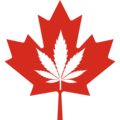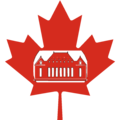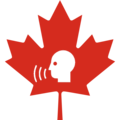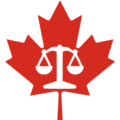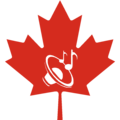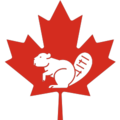Portal:Canada
| Showcase | Contents | Contributing |
Introduction
Canada is a country in North America. Its ten provinces and three territories extend from the Atlantic Ocean to the Pacific Ocean and northward into the Arctic Ocean, making it the world's second-largest country by total area, with the world's longest coastline. Its border with the United States is the world's longest international land border. The country is characterized by a wide range of both meteorologic and geological regions. With a population of just over 41 million people, it has widely varying population densities, with the majority residing in urban areas and large areas of the country being sparsely populated. Canada's capital is Ottawa and its three largest metropolitan areas are Toronto, Montreal, and Vancouver.
A developed country, Canada has a high nominal per capita income globally and its advanced economy ranks among the largest in the world by nominal GDP, relying chiefly upon its abundant natural resources and well-developed international trade networks. Recognized as a middle power, Canada's support for multilateralism and internationalism has been closely related to its foreign relations policies of peacekeeping and aid for developing countries. Canada promotes its domestically shared values through participation in multiple international organizations and forums. (Full article...)
Featured article -

The 1937 Social Credit backbenchers' revolt took place from March to June 1937 in the Canadian province of Alberta. It was a rebellion against Premier William Aberhart by a group of backbench (not part of the cabinet) members of the Legislative Assembly (MLAs) from his Social Credit League. The dissidents were unhappy with Aberhart's failure to provide Albertans with CA$25 monthly dividends through social credit as he had promised before his 1935 election. When the government's 1937 budget made no move to implement the dividends, many MLAs revolted openly and threatened to defeat the government in a confidence vote. (Full article...)
Current events
- April 28, 2025 – 2025 Canadian federal election
- Voters in Canada go to the polls to elect the 343 members of the House of Commons to the 45th Canadian Parliament. (BBC)
- The Liberal Party under leader Mark Carney is projected to form government for the party's fourth consecutive mandate, with Carney remaining prime minister. (The Globe and Mail)
- Conservative Party leader Pierre Poilievre and New Democratic Party leader Jagmeet Singh lose their seats, with the NDP also losing official party status in the House. Each make speeches conceding the election, with Singh announcing his intention to resign as party leader. (CTV News)
- April 27, 2025 – 2025 Vancouver car attack
- The death toll from yesterday's vehicle-ramming attack at a street festival in Vancouver, British Columbia, Canada, rises to eleven with at least 20 others injured, making the attack tied for the deadliest vehicle-ramming attack in Canadian history. The British Columbia Prosecution Service charges the perpetrator with eight counts of second-degree murder, while investigators also rule out terrorism. (CTV News) (AP)
- April 26, 2025 – 2025 Vancouver car attack
- Nine people are killed and several others injured, after a car is driven through a crowd at a Philippine-Canadian festival in Vancouver, British Columbia, Canada. (Al Jazeera)
- April 25, 2025 –
- A Royal Thai Police Viking DHC-6 Twin Otter aircraft crashes while conducting a test flight for parachuting training near Hua Hin Airport in Prachuap Khiri Khan, Thailand, killing all six people on board. (The Nation) (AP)
Selected panorama -
Woody Point, Western Newfoundland. Panorama of the Gros Morne National Park with the Tablelands, overlooking Bonne Bay
Credit: Tango7174
National symbol -

A mari usque ad mare (Latin: [aː ˈmariː ˈuːskᶣɛ ad ˈmarɛ]; French: D'un océan à l'autre, French pronunciation: [dœ̃nɔseˈã aˈloʊ̯tʁ]; English: From sea to sea) is the Canadian national motto. The phrase comes from the Latin Vulgate translation of Psalm 72:8 in the Bible: (Full article...)
Selected vital article -
Human rights in Canada have come under increasing public attention and legal protection since World War II. Inspired by Canada's involvement in the creation of the Universal Declaration of Human Rights in 1948, the current legal framework for human rights in Canada consists of constitutional entitlements, and statutory human rights codes, both federal and provincial. (Full article...)
Selected picture -
Credit: Image by Alan D. Wilson, modified by Diliff (cropped and noise reduction applied).
Featured biography -

Frances Kathleen Oldham Kelsey CM (née Oldham; July 24, 1914 – August 7, 2015) was a Canadian-American pharmacologist and physician. As a reviewer for the U.S. Food and Drug Administration (FDA), she refused to authorize thalidomide for market because she had concerns about the lack of evidence regarding the drug's safety. Her concerns proved to be justified when it was shown that thalidomide caused serious birth defects. Kelsey's career intersected with the passage of laws strengthening FDA oversight of pharmaceuticals. Kelsey was the second woman to receive the President's Award for Distinguished Federal Civilian Service, awarded to her by John F. Kennedy in 1962. (Full article...)
Did you know -

- ... that more than one million applications for the Canadian Dental Care Plan were approved in its first three months?
- ... that both Christian Albright and De'Montre Tuggle were born on the same day, named second-team all-Mid-American Conference in 2020, signed with the Chicago Bears in 2022, and debuted in the CFL in 2023?
- ... that Canadian singer Tate McRae is a trained ballet dancer and started her musical career by accident?
- ... that Banner in the Sky inspired a Canadian dentist to climb the Matterhorn?
- ... that a member of the House of Lords was the principal of a Canadian junior school?
- ... that Theo Benedet is the first offensive lineman to be named the best Canadian university football lineman two years in a row?
- ... that before the House of Commons of Canada considers a taxation or spending bill, a royal recommendation has to be given by the governor general?
Featured list -
This list of birds of Ontario includes all the bird species recorded in the Canadian province of Ontario as determined by the Ontario Bird Records Committee (OBRC). As of August 2024 there were 511 species on this list, 291 of which are known to breed in the province. Ontario has a considerable variety of bird species. One of the factors in this diversity is the size and range of environments in Ontario. Another is the Great Lakes; many birds use the shores as a stopping point during migration. (Full article...)
Main articles
Associated Wikimedia
The following Wikimedia Foundation sister projects provide more on this subject:
-
Commons
Free media repository -
Wikibooks
Free textbooks and manuals -
Wikidata
Free knowledge base -
Wikinews
Free-content news -
Wikiquote
Collection of quotations -
Wikisource
Free-content library -
Wikiversity
Free learning tools -
Wikivoyage
Free travel guide -
Wiktionary
Dictionary and thesaurus





